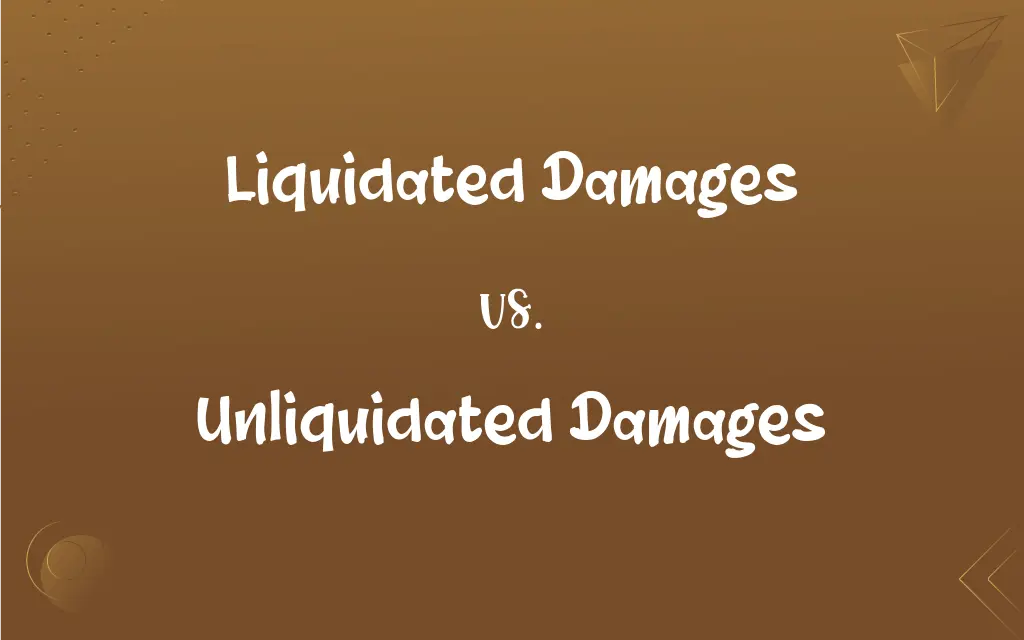Liquidated Damages vs. Unliquidated Damages: What's the Difference?
Edited by Aimie Carlson || By Janet White || Published on March 13, 2024
Liquidated damages are predetermined and agreed upon in a contract, while unliquidated damages are not specified and determined by a court.

Key Differences
Liquidated damages are pre-established penalties for breaching a contract, agreed upon by the parties involved. Unliquidated damages, in contrast, are not predefined and arise when a breach occurs without prior agreement on the amount.
Liquidated damages serve as a deterrent and a measure of security for contractual obligations. Unliquidated damages are assessed and awarded by a court, reflecting the actual loss suffered due to the breach.
The purpose of liquidated damages is to simplify the compensation process and avoid litigation. Unliquidated damages require judicial intervention to ascertain the extent of the loss and appropriate compensation.
In the case of liquidated damages, the amount is usually stipulated in the contract terms. Unliquidated damages, however, are determined after the fact, considering the actual harm or loss incurred.
Liquidated damages must be a reasonable estimate of potential loss at the time of contract formation. Unliquidated damages, being retrospective, are based on the real damages sustained, which could be more or less than any pre-agreed sum.
ADVERTISEMENT
Comparison Chart
Definition
Predetermined penalties in a contract
Damages determined by a court post-breach
Agreement
Agreed upon at the time of contract formation
Not pre-agreed, assessed after a breach
Purpose
Simplify compensation, avoid litigation
Reflect actual loss, require judicial assessment
Assessment Basis
Based on an estimate of potential loss
Based on actual loss incurred
Legal Requirement
Must be a reasonable estimate of loss
Must reflect actual damages sustained
ADVERTISEMENT
Liquidated Damages and Unliquidated Damages Definitions
Liquidated Damages
Pre-agreed sum as compensation for specific contract failures.
If the software is not delivered on time, the company will owe liquidated damages.
Unliquidated Damages
Damages quantified after a breach, considering the specific circumstances.
The unliquidated damages awarded took into account the unique nature of the loss.
Liquidated Damages
An agreed penalty in a contract, enforceable if the terms are not met.
Liquidated damages were enforced when the supplier failed to meet the agreed standards.
Unliquidated Damages
Compensation determined after a breach, based on actual harm.
Unliquidated damages were calculated based on the actual impact of the breach.
Liquidated Damages
A contractual provision specifying a fixed amount to be paid in case of a breach.
The contract included liquidated damages of $10,000 for late delivery.
Unliquidated Damages
Judicially assessed damages for a contract breach, reflecting real loss.
The court's assessment of unliquidated damages compensated for the unexpected disruption.
Liquidated Damages
A monetary compensation amount set in a contract for non-performance.
The builder agreed to pay liquidated damages if the project exceeded the deadline.
Unliquidated Damages
Post-breach compensation, not predetermined in contractual terms.
Due to the lack of a liquidated damages clause, the plaintiff sought unliquidated damages.
Liquidated Damages
Fixed damages named in a contract to deter breach and simplify dispute resolution.
To ensure timely completion, the contract stipulated liquidated damages for delays.
Unliquidated Damages
Damages awarded by a court, not pre-specified in a contract.
The judge awarded unliquidated damages for the unforeseen losses.
FAQs
How are unliquidated damages determined?
By a court, based on actual loss post-breach.
Can liquidated damages be renegotiated?
Generally, no, they are fixed at contract formation.
What are liquidated damages?
Predefined compensation for breach of contract.
What's the main purpose of liquidated damages?
To provide certainty and deter breach of contract.
Are unliquidated damages always higher than liquidated damages?
Not necessarily; they reflect actual loss, which can be higher or lower.
Are liquidated damages enforceable in all contracts?
Only if they are a reasonable estimate of potential loss.
How are unliquidated damages different from penalties?
They compensate for loss, rather than punish for breach.
Do unliquidated damages require proof of loss?
Yes, they are based on the actual harm suffered.
Do liquidated damages clauses deter lawsuits?
Yes, by providing a clear remedy, they often reduce litigation.
What type of evidence is needed for unliquidated damages?
Proof of actual loss and its direct link to the breach.
Are unliquidated damages common in business contracts?
Less common, as businesses prefer the certainty of liquidated damages.
Can unliquidated damages be negotiated after a breach?
Parties can settle, but if not, a court decides the amount.
How quickly are unliquidated damages awarded?
It varies, depending on the legal process and case complexity.
Are unliquidated damages subjective?
They are subject to judicial discretion based on evidence and circumstances.
Can liquidated damages be challenged in court?
Yes, if deemed as a penalty or unreasonable.
Can liquidated damages be more than the contract value?
Typically no, as they must reflect potential loss reasonably.
What factors influence the amount of liquidated damages?
Potential loss at the time of contract formation.
Can liquidated damages be less than the actual loss?
Yes, if the agreed amount is lower than the subsequent loss.
Who assesses unliquidated damages?
A judge or jury, based on the specifics of the case.
Is a liquidated damages clause mandatory in contracts?
No, but it's advisable in many commercial agreements.
About Author
Written by
Janet WhiteJanet White has been an esteemed writer and blogger for Difference Wiki. Holding a Master's degree in Science and Medical Journalism from the prestigious Boston University, she has consistently demonstrated her expertise and passion for her field. When she's not immersed in her work, Janet relishes her time exercising, delving into a good book, and cherishing moments with friends and family.
Edited by
Aimie CarlsonAimie Carlson, holding a master's degree in English literature, is a fervent English language enthusiast. She lends her writing talents to Difference Wiki, a prominent website that specializes in comparisons, offering readers insightful analyses that both captivate and inform.
































































